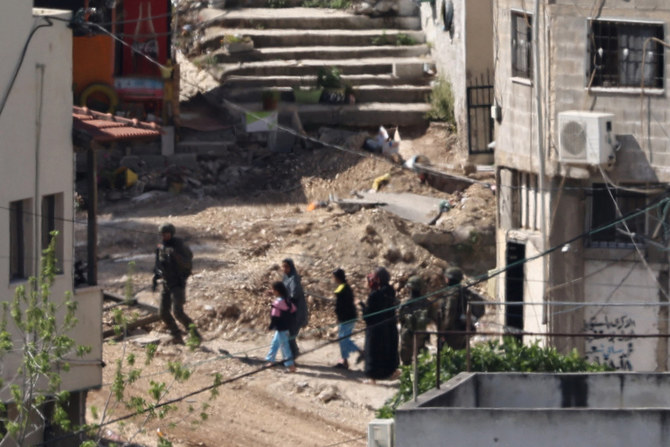WASHINGTON: A former senior US official who until recently helped oversee human-rights compliance by foreign militaries receiving American military assistance said Wednesday that he repeatedly observed Israel receiving “special treatment” from US officials when it came to scrutiny of allegations of Israeli military abuses of Palestinian civilians.
The allegation comes as the Biden administration faces intense pressure over its ally’s treatment of Palestinian civilians during Israel’s war against Hamas in Gaza. And it matters because of who said it: Charles O. Blaha.
Before leaving the post in August, he was a director of a State Department security and human rights office closely involved in helping ensure that foreign militaries receiving American military aid follow US and international humanitarian and human rights laws.
Blaha said his departure from the State Department after decades of service was not related to the US-Israeli security relationship. He is the second senior State official involved in that relationship to assert that when it comes to Israel, the US is reluctant to enforce laws required of foreign militaries receiving American aid.
“In my experience, Israel gets special treatment that no other country gets,” Blaha said. “And there is undue deference, in many cases, given” to Israeli officials’ side of things when the US asks questions about allegations of Israeli wrongdoing against Palestinians, he added.
He spoke to reporters at an event where he and other members of an unofficial, self-formed panel of former senior US civilian and military officials released a report pointing to civilian deaths in specific airstrikes in Gaza. They said there was “compelling and credible” evidence that Israeli forces had acted illegally.
Blaha’s comments echoed those of another State Department official and panel member, Josh Paul. Paul resigned as a director overseeing arms transfers to other countries’ militaries in October in protest of the US rushing arms to Israel amid its war in Gaza.
Asked about the allegations from the two, a State Department spokesman, Vedant Patel, said “there is no double standard, and there is no special treatment.”
Israeli officials did not immediately respond to a request for comment. Israel consistently says it follows all laws in its use of US military aid, investigates allegations against its security forces and holds offenders accountable.
Israel historically is the United States’ biggest recipient of military aid, and Biden on Wednesday signed legislation for an additional $26 billion in wartime assistance. But Biden has come under growing pressure over that support as Palestinian deaths mount.
The latest Israel-Hamas war began on Oct. 7, when Hamas and Islamic Jihad, two militant groups backed by Iran, carried out a cross-border attack that killed 1,200 people in Israel. Israel responded with an offensive in Gaza that has caused widespread devastation and killed more than 34,000 people, according to local health officials.
In coming days, the administration says it will announce its official findings from reviews it did into allegations of especially serious human rights abuses by specific Israeli military units. Those units would be barred from receiving US military aid if the US review confirms those allegations.
Separately, the Biden administration also is expected to disclose by May 8 whether it has verified assurances from Israel that the country is not using US military aid in a way that violates international or human rights law. Both Israel’s written assurance and the US verification were mandated by a new presidential national security memo that Biden issued in February.
The February agreement was negotiated between the Biden administration and members of his own Democratic Party, who had been pushing for the US to begin conditioning military aid to Israel on improving treatment of Palestinian civilians.
Panel members released their report Wednesday to urge the US to scrutinize specific attacks in Gaza that the former officials argued should lead to a conclusion that Israel was wrong when it confirmed it was complying with the laws. If that determination is made, the US could then suspend military aid.
Wednesday’s unofficial report points to 17 specific strikes on apartments, refugee camps, private homes, journalists and aid workers for which the former US officials and independent experts allege there’s no evidence of the kind of military target present to justify the high civilian death tolls.
They include an Oct. 31 airstrike on a Gaza apartment building that killed 106 civilians, including 54 children. Israeli officials offered no reason for the strike, and a Human Rights Watch probe found no evidence of a military target there, the officials said. Israel has said in many of the instances that it is investigating.
























